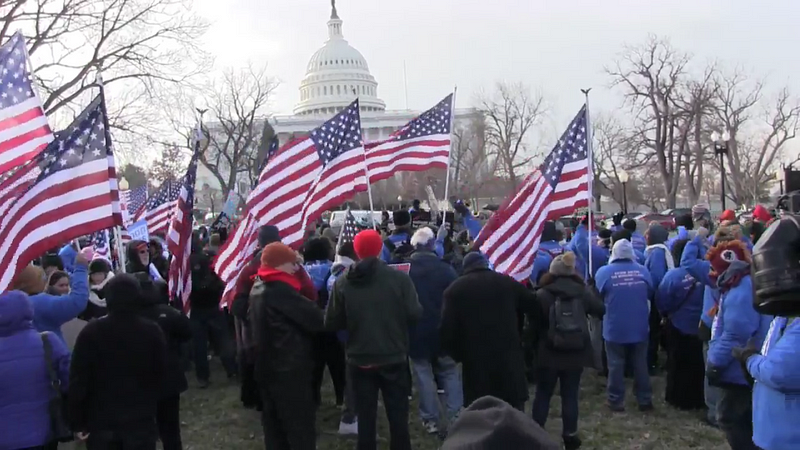Low-wage workers celebrate the defeat of Trump’s Labor pick

Low-wage Capitol Hill workers had planned to protest Thursday against the Senate’s scheduled confirmation hearing for President Donald Trump’s Labor Secretary nominee. But after fast food CEO Andy Puzder officially withdrew his name on Wednesday evening, the strike protest transformed into a victory rally.
“Our voices have been heard. That man will not be Secretary of Labor,” Sen. Elizabeth Warren (D-MA) said, to cheers from workers assembled outside a Senate office building.
The workers rallying Thursday are part of a movement that goes back nearly four years. The federal government contracts out for service work at most of its facilities, shipping billions in taxpayer money to companies that squeeze their labor costs to increase profits from the contracts. The results are especially ugly in Congress, where millionaire elected officials are served by cafeteria staff who earn so little that they cannot keep their families together, let alone achieve basic financial security.
Puzder’s nomination was a symbolic thumb in the eye to federal contract workers. As the CEO of fast food conglomerate CKE Restaurants Holdings, Puzder oversaw the same kind of exploitative business model at Carl’s Jr., Hardee’s, and other chains.
“Even though we work hard we can barely afford to pay the rent, keep the lights on, or even put food on the table. I went to college and earned a masters degree,” striking worker Brittany Butler said Thursday, “and the sad fact is I’m not alone.”
Frontline service employees began agitating for higher wages at facilities around Washington, D.C. at about the same time as the broader Fight for $15 movement took off nationwide. Intermittent one-day strikes have hit the Capitol, the Pentagon, Washington’s central train station, and numerous other federally-controlled buildings here in the years since.
President Obama used executive actions to partially grant these workers’ requests, mandating that contractors begin paying at least $10.10 per hour and instructing federal contracting officers to consider a company’s history of wage and hour law violations before deciding which firms would get the taxpayer’s business. Republicans opposed those moves and intend to override them, freeing companies like British-owned Restaurant Associates to resume their old tricks. Puzder built a career on similar tactics.
As Republicans repeatedly delayed and rescheduled hearings on Puzder’s nomination to the nation’s top labor post, Democrats invited workers from his companies to the Hill to testify about life on the front lines of the mulit-millionaire’s companies. Sexual harassment, dangerous work conditions, chaotic scheduling policies that chip away at take-home pay, and flat-out wage theft are all common at Puzder’s companies — and across most of the fast food business, where multi-billion-dollar companies insist they cannot afford to treat workers fairly.
The CEO’s affection for sexualized burger ads and his alleged history of spousal abuse may not have seemed like an obstacle to Trump, whose own past is crowded with sexual assault allegations and demeaning public comments about women who accuse or even criticize him. But Puzder’s alleged history only made his climb to a cabinet post steeper, ultimately helping to force his withdrawal after a group of Republican senators reportedly urged the White House to give up on him.
Trump’s choice signaled an intention not just to defy the wage protests fueling the most energetic labor movement in the United States today, but to grind down a much broader slate of protections for working people’s bottom line.
Forcing Puzder to withdraw doesn’t change the GOP’s plans all that much. Lawmakers and the White House will still pursue nationwide versions of the anti-worker laws that have become prevalent in Republican-controlled states in recent years, from so-called “right to work” laws that drive wages down to the elimination of prevailing wage laws that prevent the race-to-the-bottom economics of fast food from spreading to the building trades.
Speakers at Thursday’s rally were clear-eyed about the ongoing threats workers face from the current federal government, even after Puzder’s resignation.
“The next Secretary of Labor may still be a problem, but we have done two things today,” Warren said. “We have shown that we are here — we are watching, we are going to pay attention — and we are willing to fight.”
Sen. Bernie Sanders (D-VT) reminded workers that Puzder’s withdrawal is only the latest in a string of victories for a movement that’s begun driving wage floors upward in numerous states and cities around the country, and urged the group not to be discouraged by the Trump regime.
“Right now we are in tough times, no question about it,” Sanders said. “But when millions of us stand together and demand a govt that represents all of us and not just billionaires, we are gonna win this fight. We are gonna transform this country.”
Butler went further, trying to connect the Trump campaign’s proclaimed interest in helping working-class Americans to concrete government policies.
“Mr. Trump, you promised a change if you were elected president,” Butler said. “Well actions surely speak louder than words, and your nomination of Andy Puzder as Labor Secretary is atrocious.”
“Mr. Trump we are calling on you to stop the war on workers,” she said. “We are calling on you to stop stealing from us.”
***
This was reposted from ThinkProgress.
***
Photo from Good Jobs Nation.

